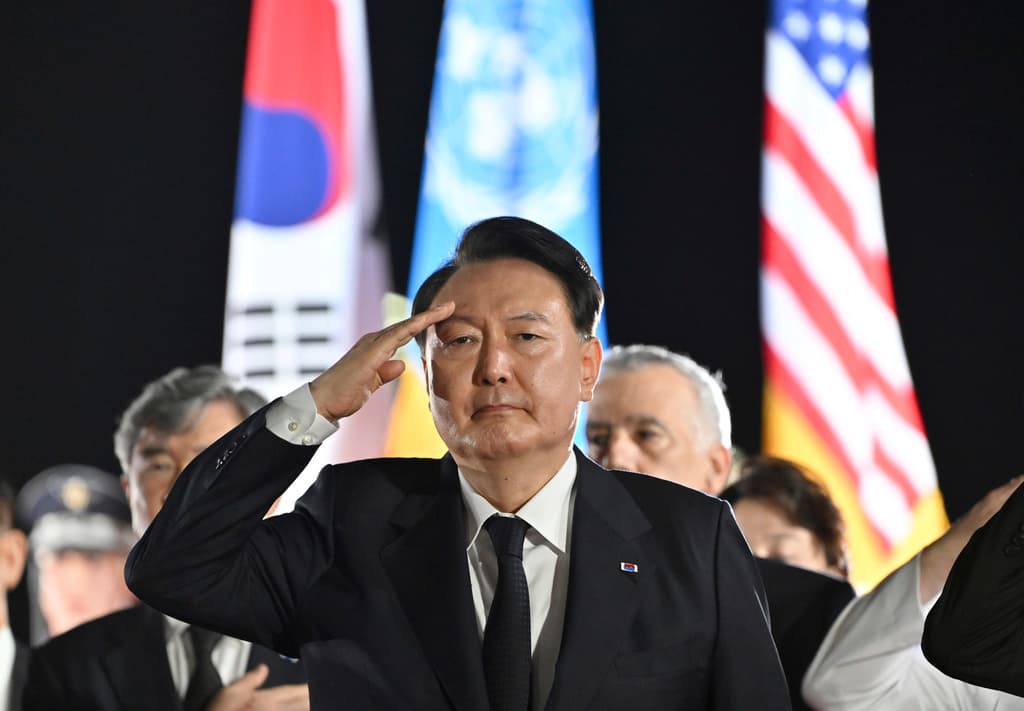South Korea’s Yoon, the Conservative President, Facing Serious Challenge in Legislative Elections Next Month
Vote could hobble the government’s ability to pass its programs during the final three years left in Mr. Yoon’s term.

South Korean warplanes roar overhead in a display celebrating the first day of Korea’s week-long Cherry Blossom festival while hundreds of visitors troop through the small American navy base in the industrial port of Changwon on the southern coast.
The display, on the ground and in the air, shows off the power and influence of the Korean-American alliance while North Korea’s leader, Kim Jong-Un, sells arms and ammunition to Russia and deluges the South with rhetoric and threats of a nuclear holocaust.
Free Koreans, though, are divided over the best response to North Korea, as hundreds of candidates vie for all 300 seats in South Korea’s National Assembly elections on April 10 in which the conservative President Yoon faces a serious challenge to his policies. Polls show the liberal Minjoo, or Democratic, Party may increase its slight majority over Mr. Yoon’s People Power Party, making life difficult for him as he enters the final three years of a five-year term.
“We will first of all make a ‘lame duck’ of the current government and then a ‘dead duck,’” says the leader of the minor Rebuild Korea Party, Cho Kuk, talking to foreign journalists in Seoul. Promising to ally with the Minjoo if elected, he says “President Yoon’s diplomatic policies have gone back to the Cold War era.” Yes, “I believe in the military alliance with the United States, but it’s skewed” — in favor of American interests.
Inside and outside the naval base, the exuberance is infectious as crowds surged through narrow downtown streets, past bars and cafes festooned with cherry blossoms, pulsating to traditional Korean songs and the latest K-Pop hits.
At the base, Koreans poured through the front gate, opened to visitors just for the holiday, strolling up “Cherry Blossom Lane” and lining up for hot dogs and beer. Political protests, said one of the sailors, are rare. “Maybe now and then,” he said, “but we don’t pay attention to them.”
About 60 miles west down the coast at the picturesque fishing port of Tongyeong, the mood was somewhat different. The city, famed in Korea as the cradle of both contemporary and classical music, is hosting outdoor concerts featuring popular musicians and a festival of music in a modern concert hall featuring conductors, musicians and composers from Europe along with Koreans.
Largely missing, though, is anything by the man who may be Korea’s most famous composer, Isang Yun, who died in Germany in 1995 after one of the most bizarre episodes in Cold War history. The festival program lists only single work by Yun, who’s known not only for his outpouring of music but also for his kidnapping by South Korean intelligence agents from West Berlin in 1967.
Abducted to Seoul, he was tried for espionage and sentenced to death. Under intense pressure from Germany, he was freed two years later and returned to Germany, where he died in 1995. Yun’s offense was to have visited North Korea in 2003, purportedly to capture the mood for his music. He was also known as a dissident critic of President Park Chung-hee, the late president who had presumably ordered the kidnapping and who was later assassinated by his own intelligence chief.
A year ago, South Korea’s former liberal president, Moon Jae-in, and his wife visited a memorial in Tongyeong dedicated to Yun. “Inspired by the sounds of his music, this festival came to life,” said Tongyeong’s mayor, Chun Young-gee.
Festival organizers acknowledged Yun’s controversial legacy and didn’t talk about the upcoming assembly elections and President Yoon’s tough policies against the North. “We don’t need controversy anymore,” said the festival’s director of artistic planning, Kim Soh-yun, “We’re just interested in music.”

